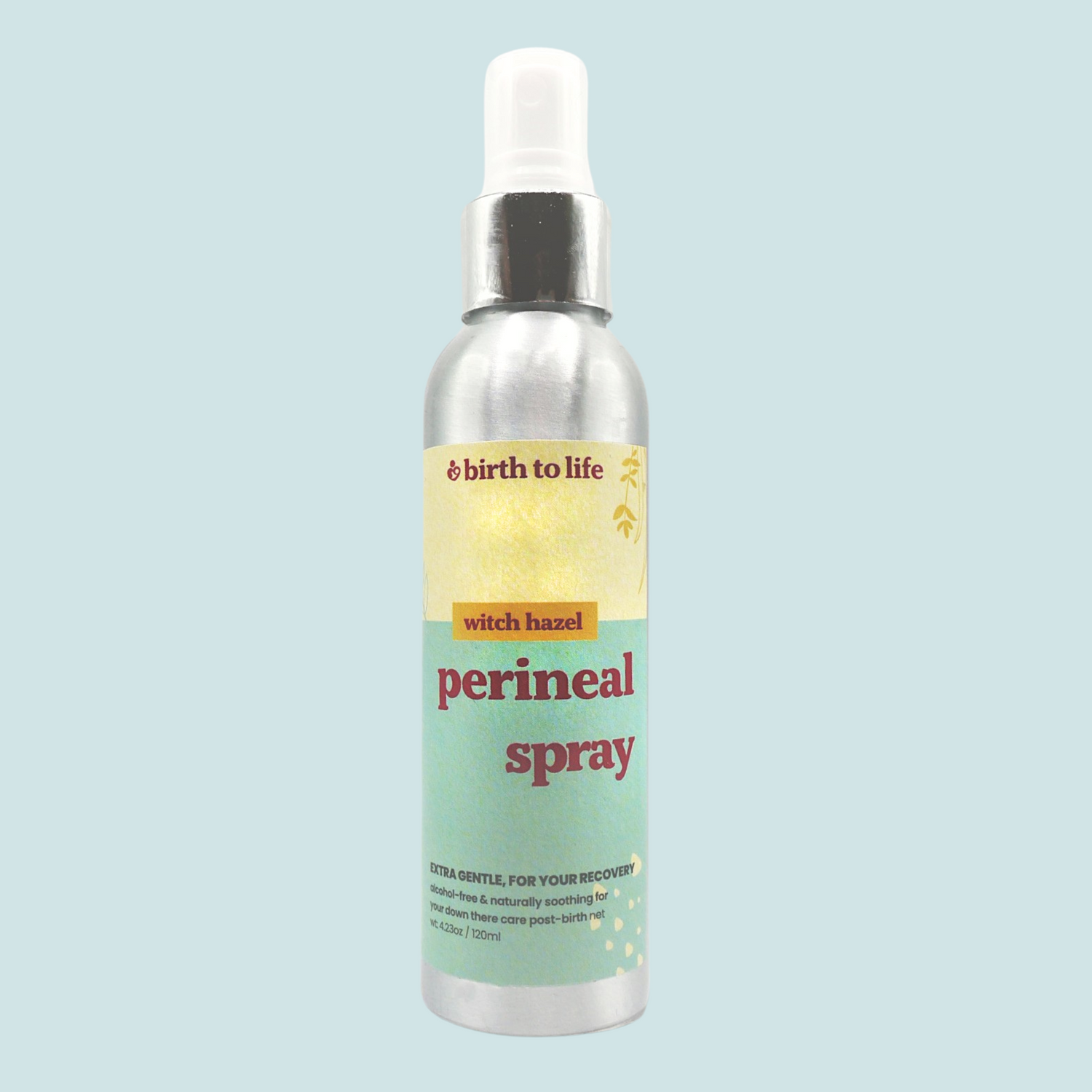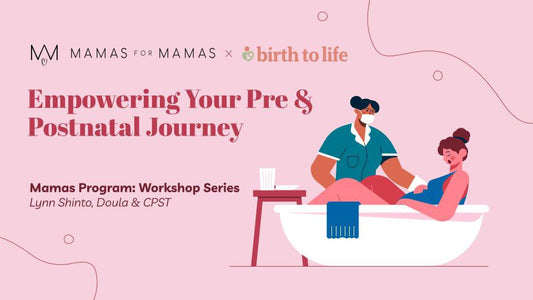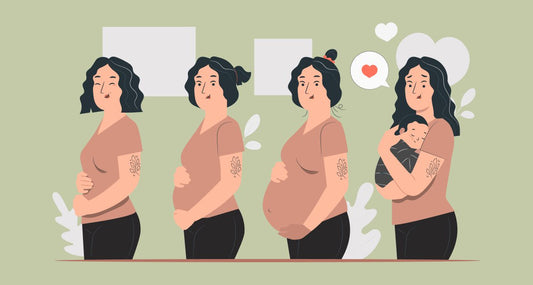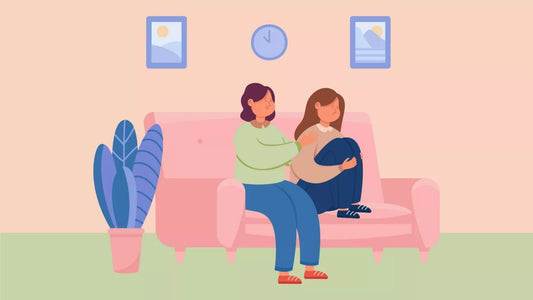Understanding Postpartum Depression: Signs, Solutions, and Support
Trigger warning: discussions about perinatal/postnatal mental health disorders, depression, anxiety, trauma, suicide, self-harm. Topics discussed in this article should not be taken as a medical diagnosis or treatment.
In this article, we will explore the topic of perinatal or postpartum mood and anxiety disorders (PMADs), or pre/postpartum depression, and discuss the signs, solutions, and support systems available for those who may be experiencing it.
What is Postpartum Depression?
Postpartum depression is a mood disorder that can affect birthing parents during pregnancy and after childbirth. It's crucial to understand that postpartum depression symptoms can also affect partners, surrogates and adoptive parents. The term 'postpartum' refers to the time after the birth of a child. Perinatal/prenatal depression includes depression that may begin during pregnancy, whereas postpartum depression may begin after the baby is born. These fall under the umbrella term perinatal or postpartum mood and anxiety disorders (PMADs).
Understanding the Difference: Baby Blues vs. Postpartum Depression
It is common for new parents to experience mood changes and feelings of worry, sadness, or exhaustion in the first two weeks after giving birth, often referred to as the 'baby blues'. The baby blues are generally mild and resolve on their own within a couple of weeks. However, if the symptoms are severe or persist beyond two weeks, it may be a sign of the onset of postpartum depression or anxiety.
The key difference between baby blues and postpartum depression is the intensity and duration of the symptoms. While the baby blues are temporary and typically resolve on their own, postpartum depression is a more serious condition that requires treatment to improve. It is essential to reach out for professional help if you are experiencing prolonged or severe symptoms.

Signs and Symptoms of Postpartum Depression
The signs of postpartum depression and symptoms can vary from person to person. Some common depression symptoms may include:
- Persistent feelings of sadness, anxiety, or emptiness.
- Irritability and mood swings.
- Feelings of guilt, worthlessness, or hopelessness.
- Loss of interest or pleasure in activities.
- Fatigue or a significant decrease in energy.
- Restlessness or difficulty sitting still.
- Difficulty concentrating, remembering, or making decisions.
- Changes in appetite or weight.
- Sleep disturbances, such as insomnia or excessive sleep.
- Physical symptoms without a clear cause, such as headaches or digestive problems.
- Prolonged trouble bonding with the baby or forming an emotional attachment.
- Thoughts of death, suicide, or harming oneself or the baby (which requires immediate attention/support or calling 9-1-1).
If you or someone you know is experiencing these symptoms, it is important to seek help from a doctor or a healthcare provider. Remember, you are not alone, and there are resources such as support groups and counselling for postpartum depression available to support you.
Causes and Risk Factors of Postpartum Depression
The exact cause of postpartum depression is not known, but it is likely a combination of genetic, hormonal, and environmental factors. Pregnancy and childbirth bring about significant hormonal changes, including a rapid drop in hormone levels after delivery. These hormonal fluctuations may contribute to the development of postpartum depression, anxiety, or other mental health challenges.
In addition to hormonal changes, other risk factors for postpartum depression include:
- Personal or family history of depression or mental health conditions.
- Previous experience of postpartum depression.
- High levels of stress, such as financial difficulties or relationship problems.
- Lack of social support.
- Unplanned or unwanted pregnancy.
- Complications, trauma, or high anxiety during pregnancy or childbirth.
- Unsupportive birth team, loss of control/respect during birth.
- Sleep deprivation.
- History of trauma or abuse.
- Difficulties with breast/chest-feeding or caring for the baby.
It's crucial to understand that the risks of postpartum depression can affect anyone, regardless of age, race, income, or education. Seeking safe support and treatment is vital for the well-being of both the birthing parents and the baby.

The Impact of Postpartum Depression on Birthing Parents and Babies
Untreated postpartum depression can have significant and lasting effects on both the birthing parents and the child. Research suggests that for birthing parents, untreated postpartum depression can lead to prolonged depressive symptoms, difficulties in bonding with the baby, strained relationships, and an increased risk of chronic depression or anxiety disorders. There's also an elevated risk of self-harm or suicide in severe cases.
For the child, the consequences can include developmental delays, emotional and behavioural problems, insecure attachment with the parents, and impaired cognitive and social development.
Recognizing and addressing postpartum depression is crucial for the well-being of the entire family, including partners. Coping with postpartum depression involves self-care in postpartum and managing signs of postpartum depression and anxiety effectively.
Treatment Options for Postpartum Depression
Fortunately, postpartum depression is a treatable condition, and there are various treatment options available, including therapy, medication, holistic care treatments, or a combination of various care practices that suit your specific needs:
Therapy
Psychotherapy, also known as talk therapy or counselling for postpartum depression, is a common and effective treatment. Some evidence-based therapeutic approaches for PMADs are cognitive-behavioural therapy (CBT), interpersonal therapy (IPT), and eye movement desensitization and reprocessing (EMDR), often recommended by doctors:
- Cognitive-behavioural Therapy (CBT): CBT helps individuals identify and challenge negative thoughts and behaviors that contribute to their depression. It focuses on developing healthier coping strategies and improving problem-solving skills. CBT can be done individually or in group settings.
- Interpersonal Therapy (IPT): IPT focuses on improving interpersonal relationships and addressing conflicts or life events that may contribute to depression. It helps individuals develop effective communication skills and build support networks.
- EMDR (Eye Movement Desensitization and Reprocessing) Therapy: EMDR is a form of psychotherapy that helps people process distressing memories by using bilateral stimulation, such as eye movements or taps, to alleviate the emotional charge associated with those memories, allowing for reprocessing and healing. It aims to reduce the impact of past traumas and promote adaptive coping mechanisms for present challenges.
Medication
Antidepressant medication, a common perinatal/postpartum depression medication, may be prescribed to help manage the symptoms. It is important to discuss the risks and benefits of medication with a healthcare provider, especially if you are pregnant or breastfeeding. Antidepressants may take several weeks to start working, and finding the right medication and dosage may require some trial and error.
Additional Treatment Options
In some cases, brain stimulation therapies, such as electroconvulsive therapy (ECT) or transcranial magnetic stimulation (TMS), may be considered if other treatments have been ineffective. These therapies are typically reserved for severe or treatment-resistant cases of postpartum depression and should be discussed with a healthcare provider.
Other holistic treatment options include acupuncture and/or the use of Traditional Chinese medicinal herbs. Acupuncture, within the realm of Traditional Chinese Medicine (TCM), is believed to rebalance the flow of energy or "qi" in the body. By targeting specific points with thin needles, it's thought to alleviate symptoms of postpartum depression by promoting relaxation, reducing stress, and restoring hormonal balance. Additionally, TCM herbal remedies may complement acupuncture by addressing underlying imbalances in the body that could contribute to postpartum depression, aiming to support overall mental and emotional well-being during this phase.
Seeking Support and Building a Strong Network
In addition to professional treatment, it's crucial to seek support from family, partners, and loved ones, building a robust support system. Joining a support group or engaging in peer support can make a significant difference in your journey through postpartum depression. Surrounding yourself with understanding and empathetic individuals, especially those in your family, can enhance your postpartum support and help manage support for postpartum depression.
Consider the following strategies for building a strong support network:
Reach out to family and friends: Share your feelings and experiences with trusted individuals who can offer emotional support and practical assistance.
- Join support groups: Connecting with other individuals who have experienced or are experiencing postpartum depression can provide validation, understanding, and a sense of community. Look for local support groups or online communities that specialize in postpartum depression (Pacific Postpartum Support Society is a fantastic, local resource in Vancouver).
- Seek professional help: Working with a registered clinical counsellor, therapist, or psychiatrist who specializes in perinatal mental health can provide expert guidance and support tailored to your unique needs.
- Prioritize self-care: Make time for activities that bring you joy and relaxation. Engage in gentle exercises, practice mindfulness or meditation, and ensure you are getting enough rest and nourishing food.
Remember, seeking help is a sign of strength, and you are not alone in this journey.
You Are Not Alone
Postpartum depression is a challenging and often overwhelming experience, but it is important to remember that you are not alone. Postpartum support and support for postpartum depression are readily available, and effective treatments can significantly improve your well-being and the well-being of your baby.
If you suspect that you or someone you know may be experiencing PMADs, don't hesitate to reach out to a doctor or a healthcare provider. Early intervention and seeking help with proper diagnoses of perinatal or postpartum mental health disorders from medical/health professionals are key to recovery.








0 comments